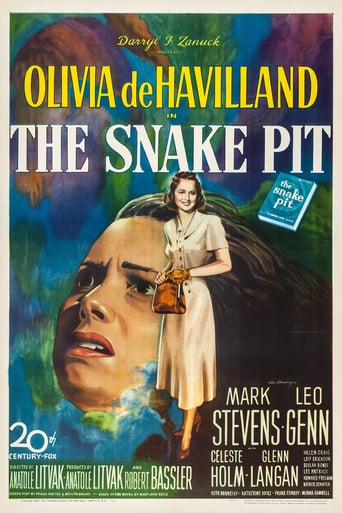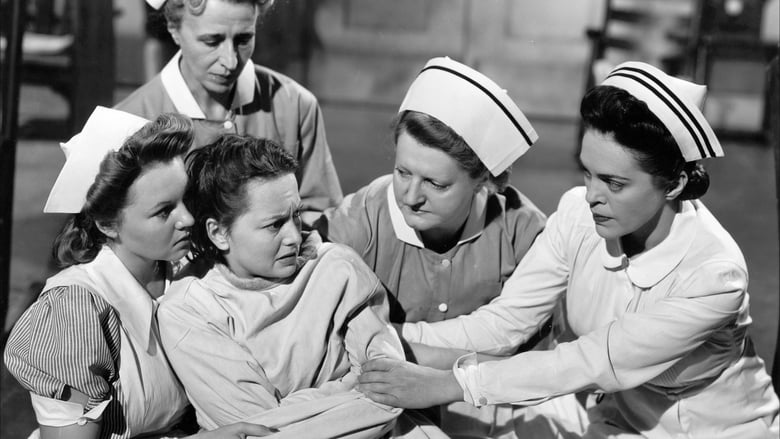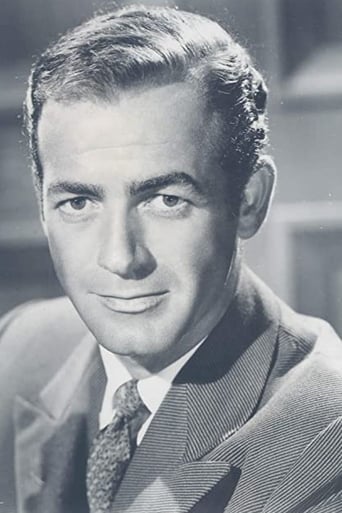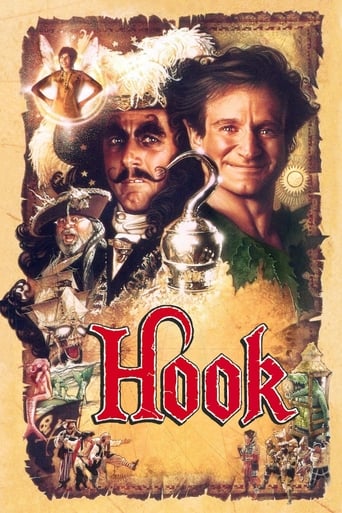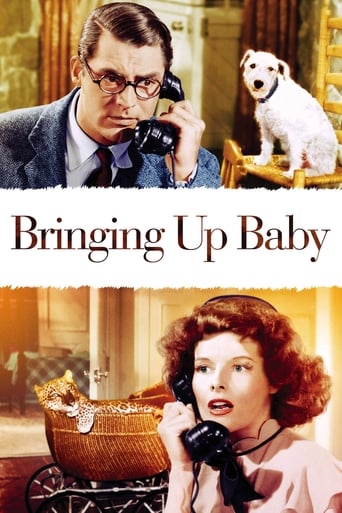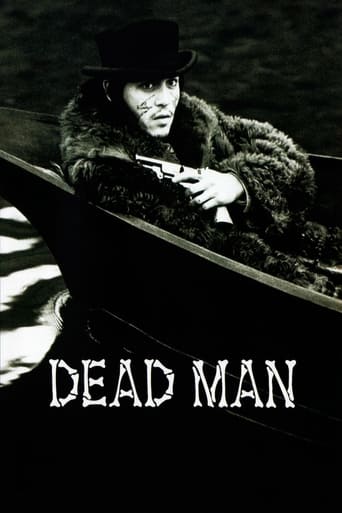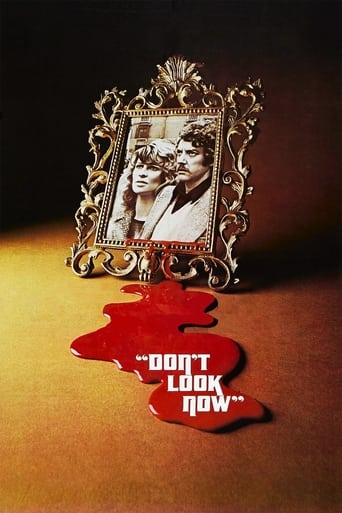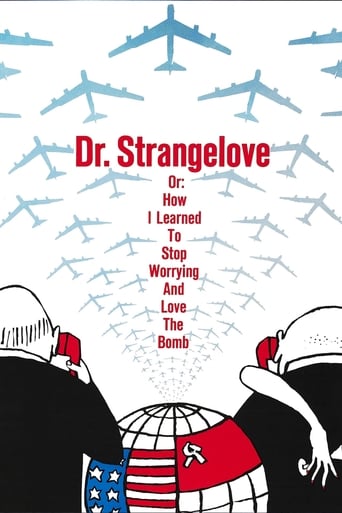The Snake Pit (1948)
Virginia Cunningham is confused upon finding herself in a mental hospital, with no memory of her arrival at the institution. Tormented by delusions and unable to even recognize her husband, Robert, she is treated by Dr. Mark Kik, who is determined to get to the root of her mental illness. As her treatment progresses, flashbacks depict events in Virginia's life that may have contributed to her instability.
Watch Trailer
Cast



Similar titles
Reviews
Captivating movie !
it is finally so absorbing because it plays like a lyrical road odyssey that’s also a detective story.
This is a must-see and one of the best documentaries - and films - of this year.
All of these films share one commonality, that being a kind of emotional center that humanizes a cast of monsters.
NOTE: The following review is based on the full-length American version. The skilfully re-cut Australian version is a much better picture.COMMENT: Olivia De Havilland's performance is faulty and too obviously contrived, though she does seem real enough most of the time, unlike young Lora Lee Michel who convinces none of the time. Mark Stevens is none too solid in support and Leo Genn is too conventionally re-assuring. Fortunately Stevens' role is small but Genn's is large and his too-pat doctor is unconvincing enough to seriously fault the film as a whole. Celeste Holm has a funny role. She disappears from the film without explanation. Some of the patients are too much like caricatures to be believable. There is an obvious straining after effects in the acting, in the too-contrived script, too much weight on boring or unconvincing or stagily written, delivered and directed dialogue (note the scene in which all the kinky patients get a chance to display their particular brand of lunacy individually, each giving a turn one after the other like so many vaudeville acts). Contrivances in the plot ensure that the heroine gets a chance to sample all the wards, patients, nurses, doctors and treatments. These twists were probably not so obvious in the original novel but the mechanics are very patent in the film. Still director Litvak and his photographer and the art directors are at their best in the broad effects. The De H. story is too weighed down by her unsympathetic character, the too great a weight on dialogue, the clichés, and the director's penchant for unflattering (De H.) or too flattering close-ups (Genn). The main plot just isn't interesting enough because the De H. character herself isn't interesting or sympathetic enough. Oddly, the fact that she is so unglamorous weighs against her! If the doctors had been less cliched, the script might have got away with it, but as it is, the formula is not right. The film as a whole does not succeed, despite the power and the impact of many sequences. Litvak is at his best with groups, using effective crane and dolly shots, but otherwise the handling tends to look like superior TV.
I have no experience with mental institutions, not modern ones and certainly not those that existed in 1948. But I have enough experience with medical institutions and institutions in general to believe that "The Snake Pit," Anatole Litvak's harrowing film about one woman's journey through the hell of mental illness, gives a fairly accurate account. It's of course a bit histrionic and heavy handed in the way most films from that time period were (and many are still today), but that's just a product of age, not a flaw in the filmmaking. Olivia de Havilland gives a fierce performance as a woman struggling with an unnamed mental disorder that finds her in an agonizing cycle of progress that gives her hope of recovery coupled with setbacks that send her spiraling into black holes of despair. A kind doctor (Leo Genn) helps her to uncover and face the demons that caused her disorder in the first place. A lot of time is devoted to reconstructing scenes from her childhood, and her illness is blamed on an unloving mother and guilt over her father's death. But the cause of de Havilland's illness was less interesting to me than the politics and social structure of the mental institution itself. There is a class system in place in which the healthier patients are "superior" to those less healthy; they're essentially rewarded with nicer rooms, more space, better treatment from staff, while the worst of the patients are crammed together into what amount to brick and stone dungeons. And this class system is observed not only by the hospital staff, but by the patients themselves. What's most frightening about "The Snake Pit" is how little we've advanced in the perception and treatment of mental illness in the years since the movie was made.Celeste Holm, fresh off an Oscar for "Gentleman's Agreement," has a teeny-tiny role as a fellow inmate, while Betsy Blair, also in a small role, nevertheless makes a tremendous impact in a few scenes late into the movie."The Snake Pit" garnered six Academy Award nominations in 1948, including Best Motion Picture (20th Century-Fox), Best Director (Anatole Litvak), Best Actress (Olivia de Havilland), Best Screenplay (Frank Partos and Millen Brand) and Best Dramatic/Comedy Score (Alfred Newman), but won only a single award, that for Best Sound Recording, no doubt recognizing the film's cacophony of interior and exterior ravings. De Havilland was neck and neck with Jane Wyman for the Best Actress Oscar, but Wyman prevailed for playing another woman with mental trauma in "Johnny Belinda."Grade: A
Olivia DeHavilland does a remarkable job in this film about a woman who suffers a nervous breakdown and can no longer function. She is placed in an asylum for the mentally deranged/disturbed. We are allowed inside the asylums of that day and see the day to day care of these patients.The acting is fantastic by everyone. Even the actors that have small parts. The direction great. Some of the dialog is of course dated as we don't talk like this anymore. Now we say "yeah, huh, what was that?" But here is a film that really drags you in to the scene. No mind-numbing CGI or computer graphics. This is gritty, hands on filmmaking. Olivia DeHavilland's facial expressions are perfect in every scene. She makes the best of everything she's given. Don't miss this one.
Let's hope clinical conditions have improved in the last 60 years. Because, if Virginia (de Havilland) wasn't crazy going in, she will be after staying there. Those day-room scenes are genuinely unnerving. The patients mill around like berserk billiard balls, each in an enclosed world, pursued by their own internal demons. Then there's Hester's (Betsy Blair) frozen stare that chilled me as a kid and still does. What terrible psychic injury is behind that fearful silence, and who will help overcome the unspoken torment.Yes, it's also a case for reform, but an effective one without being preachy. Hundreds of the afflicted are warehoused around an over-worked staff. No wonder nurses like Davis (a great Helen Craig) become petty tyrants, trying to keep some order. Sure, Dr. Kik (Genn) is idealized and so in her own way is Virginia. At first I thought that was nothing more than typical Hollywood pandering. But now I see the two as providing needed hope, given negative opinions of the day. With humane care there is hope for these folks. That's the point of the dance—some kind of normalcy struggling to come out. At the same time, it all comes together in that gut-wrenching "Goin' Home"— something like the choral expression of a human basic. Okay, probably some of the emotional load has caught me up. But not everything is roses. Mark Steven's understanding hubby really does go too far. Some mixed feelings about Virginia's chances would add a needed dimension. Also, the unprofessional finger-wagging looks contrived and unimaginative. I'm sure too that Kik's Freudianizing is subject to debate. And truth be told, it comes across as pretty facile. Nonetheless, the movie's well structured for overall impact. And thanks be to TCF for the supporting players who remain vivid and impressive. So, whatever the drawbacks, the movie still packs a humane message within a dramatic punch. One that can still be felt, even six decades later.

